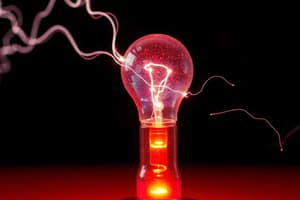Podcast
Questions and Answers
What happens to the temperature above the critical temperature for a gas?
What happens to the temperature above the critical temperature for a gas?
- It rises. (correct)
- It remains constant.
- It fluctuates.
- It continues to drop.
What is the term used to describe the point at which the cooling effect of the Joule-Thomson effect changes to a heating effect?
What is the term used to describe the point at which the cooling effect of the Joule-Thomson effect changes to a heating effect?
- Critical point
- Equilibrium point
- Transition point
- Inversion point (correct)
What is another name for the total heat of a system, defined as H = U + PV?
What is another name for the total heat of a system, defined as H = U + PV?
- Entropy
- Internal Energy
- Gibbs Free Energy
- Enthalpy (correct)
In which scenario does the Joule-Thomson effect changes sign?
In which scenario does the Joule-Thomson effect changes sign?
What is the relationship between the inversion temperature and the critical temperature?
What is the relationship between the inversion temperature and the critical temperature?
How does work production differ between Adiabatic expansion and Joule-Thomson effect?
How does work production differ between Adiabatic expansion and Joule-Thomson effect?
What does equation (4) represent in the context of the text?
What does equation (4) represent in the context of the text?
In the context of adiabatic demagnetization, what does the term 'fall in temperature' refer to?
In the context of adiabatic demagnetization, what does the term 'fall in temperature' refer to?
What is the significance of the cascade process mentioned in the liquefaction of gases?
What is the significance of the cascade process mentioned in the liquefaction of gases?
Based on the information provided, what does equation (6) primarily describe?
Based on the information provided, what does equation (6) primarily describe?
Flashcards are hidden until you start studying




